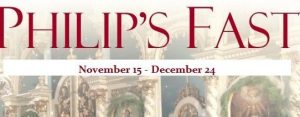Lenten Regulations 2019 of the Ukrainian Catholic Diocese of Stamford
By the threefold discipline of fasting, prayer and almsgiving the Church keeps the Great Fast/Lent from Monday, March 4 (March 11 – Julian Calendar), after the Cheesefare Sunday to the day before Easter, Holy Saturday, April 20 (April 27 – Julian Calendar).
The following regulations apply, in general, to all Ukrainian Catholics of the Stamford Eparchy between the ages 21-60:
~Abstinence from meat and dairy products on The First Day of the Great Fast, March 4 (March 11), and on Good Friday, April 19 (April 26).
The following regulations apply, in general, to all Ukrainian Catholics of the Stamford Eparchy between the ages 14-60:
~Abstinence from meat is to be observed on all Fridays and the Great Fast.
~Abstinence from meat is suggested and encouraged on all Wednesdays of the Great Fast.
Note: The following are exempt from abstinence: 1. the poor who live on alms; 2. the sick and frail; 3. Convalescents who are returning to their strength; 4. pregnant women and women who are nursing their children; and, 5. persons who perform hard labor.
Meat is to be understood as including not only the flesh, but also those parts of warm-blooded animals that cannot be rendered, i.e., melted down, e.g., the liver, lungs, etc. meat gravy or soup made from meat is included in this prohibition.
Dairy products are to be understood as comprising products derived from mammals and birds, but not regarded as meat, e.g., cheese, lard, butter, milk, eggs, etc.
Eucharistic Fast:
A fast of one hour from food (prior to service starting time) should be kept those receiving the Eucharist at the evening celebration of the Divine Liturgy of the Pre-sanctified Gifts, as well as the Divine Liturgy of St. John Chrysostom and St. Basil the Great.
 The Philip’s Fast (Pylypivka), the pre-Christmas fast, begins today. The Church begins the Fast the day after the feast of the Holy and All-Praiseworthy Apostle Philip. The Fast is a period of 40 days of spiritual preparation for the celebration of the Nativity/Theophany cycle of the liturgical (Church) year.
The Philip’s Fast (Pylypivka), the pre-Christmas fast, begins today. The Church begins the Fast the day after the feast of the Holy and All-Praiseworthy Apostle Philip. The Fast is a period of 40 days of spiritual preparation for the celebration of the Nativity/Theophany cycle of the liturgical (Church) year.